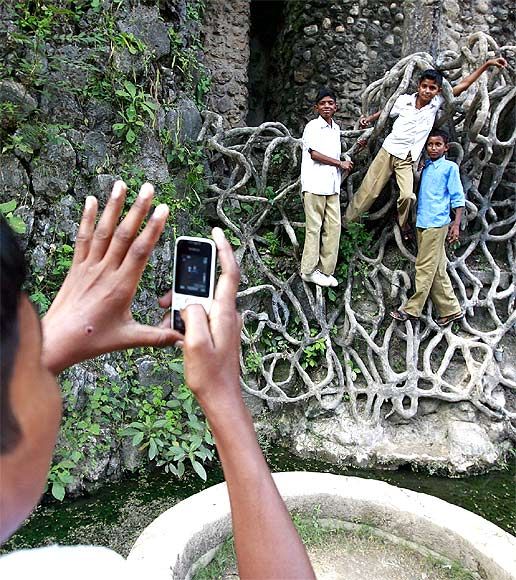 India has slipped six places to rank 89th on a global Networked Readiness Index, showing a "widespread" weakness in its potential to leverage information and communications technologies for social and economic gains.
India has slipped six places to rank 89th on a global Networked Readiness Index, showing a "widespread" weakness in its potential to leverage information and communications technologies for social and economic gains.
While Singapore has replaced Finland on the top of the 143-nation list, prepared by World Economic Forum (WEF), it has called for improvement in India's business and innovation environment, infrastructure and skills availability.
However, India has been ranked on the top globally on a sub-index for competition and affordability.
Overall, India was ranked 83rd last year, and even better at 68th position in 2013.
WEF said India's weakness is widespread, falling in the bottom half of seven of the 10 pillars of the index.
"Major areas that need improvement, according to our analysis, are the country’s business and innovation environment (115th out of 143), infrastructure (115th) and skill availability (102nd).
"The scope for ICT to bring major improvement to the country's overall economic and social development is, therefore, very high," WEF said, while lauding India for a vibrant telephony and Internet market, which has given it top position in terms of competition and affordability.
In the top 10, Singapore is followed by Finland, Sweden, the Netherlands, Norway, Switzerland, the US, the UK, Luxembourg and Japan, which has climbed an impressive six places year-on-year to 10th position.
WEF said the developing and emerging economies are failing to exploit the potential of information and communications technologies (ICT) to drive social and economic transformation and catch up with more advanced nations.
The index also suggests that the gap between the best and worst performing economies is widening. Those in the top 10 per cent have seen twice the level of improvement since 2012 than those in the bottom 10 per cent.
"This demonstrates the scale of the challenge facing developing and emerging nations as they seek to develop the infrastructure, institutions and skills needed to reap the
full benefits of ICTs, as only 39 per cent of the global population enjoys access to the Internet despite the fact that more than half now owns a mobile phone," WEF said.
It also said that the progress by the larger emerging markets towards networked readiness has been largely disappointing. The Russian Federation is the highest-placed BRICS nation, climbing nine places in 2015 to 41st.
It is joined in the top half of the ranking by China, which remains at 62. All other members of the group have declined, with South Africa coming next (75th, down five), followed by Brazil (84th, down 15) and India (89th, down six).
"The example of the BRICS is not unique: many other countries that have improved their NRI ranking over the last decade or so are now facing stagnation or regression.
"This is partly down to persisting divides within countries between rural and urban areas and across income groups, which is resulting in large portions of the population being left out of the digital economy," said Bruno Lanvin, Executive Director of INSEAD's European Competitiveness Initiative and co-editor of the WEF report.
"The report shows that the digital divide across nations is increasing and this is of great concern, given the relentless pace of technological development. Less developed nations risk being left further behind and concrete actions are needed urgently to address this," said Soumitra Dutta of CornellUniversity, who is co-editor of the report.
With high-income economies predictably occupying the top 30 places, the report does identify a number of countries that have made considerable improvements, both in terms of their index score and ranking.
The report is the result of a partnership between the WEF, INSEAD and the Samuel Curtis Johnson Graduate School of Management at Cornell University.
The Index is being published since 2001 and is based on an aggregation of 53 individual indicators grouped in four main components: environment, readiness, usage and impacts.
The individual indicators use a combination of data from publicly available sources and the results of the Executive Opinion Survey, a global survey of 13,000 business executives conducted by the WEF in collaboration with its network of 160 partner institutes.
At 89th, India is the lowest-ranked among the BRICS, WEF said, adding that the country has failed to improve its score since 2012 and lost almost 20 places.
"Despite many clusters of excellence and its knack for frugal innovation, India is not leveraging ICTs for benefits of its entire population and uptake of ICTs in India is among the lowest in the world.
"When accounting for multiple SIM-card ownership, approximately one-third of the population owns a mobile phone.
Smartphones are the privilege of the very few, with 3 mobile broadband subscriptions for every 100 population.
"Only 15 per cent of the population uses the Internet. By international standards, technology adoption by businesses remains limited, as it does within the government.
"Despite its successes and international visibility and recognition, the vibrant IT and business process management industry accounts for only 0.6 per cent of all jobs. The need for India to embrace technology to power its economy is arguably less pressing than it is for the other, richer BRICS economies, given its stage of development.
"Yet, ICTs could do wonders in improving productivity in agriculture and the services sector, while boosting access to some basic services among the rural population. Furthermore, ICTs could help fulfill India’s ambition to become a global manufacturing hub.
"A most encouraging result amid India’s mediocre performance is the country’s 1st position in the Affordability pillar, as a result of the fierce competition within the vibrant telecommunications sector," it added.





